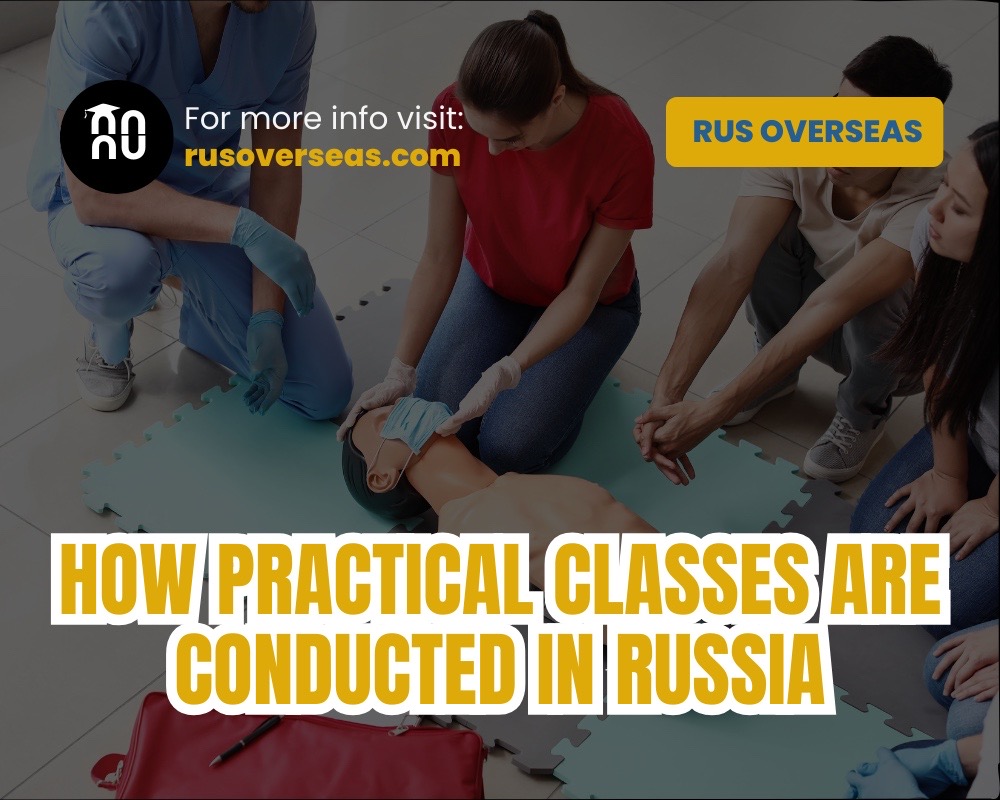How Practical Classes Are Conducted in Russia.

Okay, so you're off to study medicine in Russia? Great! You've likely already heard they really drill the theory into you, but just as worthwhile are the practical classes. They're where you actually learn to be a doctor, not just talk about it. Let's take a gander at what these classes are like.
Why Are Practical Classes So Important?
Here's how you should think about it: lectures give you the blueprint, but practicals let you build the house. They let you:
• Really Get It: You actually do and see the things you've read about. Suddenly, everything falls into place.
• Learn Actual Skills: You'll learn to examine patients, perform basic procedures, and even scrub in for surgeries. These are things you can't pick up from a book.
• Get Some Confidence: Once you're finally able to do something, you start to feel like you can be a doctor.
• Think on Your Feet: Hands-on lessons have a way of putting you right in the middle of things where you have to think on your feet. That's good training for real-world medicine.
• Work as a Team: Many lessons are done in small groups, so you learn to work together, which is important in a hospital setting.
What To Expect: A Sneak Peek into Practical Classes
Okay, so what are these classes like? It depends on the subject, but here's the concept:
1. Lab Time (Pre-Clinical Years):
• Anatomy: This is dissection time! You'll be working with cadavers (real bodies) to identify muscles, bones, nerves – everything.
• Physiology: You'll do experiments to measure things like blood pressure, heart rate, and lung function.
• Biochemistry: You'll analyze blood samples, study enzymes, and learn about all of the chemical reactions that sustain us.
• Microbiology: You'll grow bacteria, stain them, and learn to identify them under a microscope.
• Pharmacology: You'll test how drugs affect tissues and organs.
2. Clinical Skills (Clinical Years): Here you get into the hospitals and clinics:
• History Taking: You'll learn to talk to patients and get all the information you need.
• Physical Exam: You'll learn to examine patients: listening to their hearts, feeling their bellies, checking their reflexes.
• Diagnostic Procedures: You'll learn to do EKGs, urinalysis, and other basic tests.
• Basic Surgical Skills: You might even get to help with procedures and try things like suturing (sewing wounds closed).
3. Small Groups: You'll usually be in small groups, so you get more attention from the teachers.
4. Supervision: Experienced doctors and professors will be there to guide you, answer questions, and make sure you're doing everything right.
5. How They Check Your Progress:
• Practical Exams: You'll have to show what you can do.
• Oral Exams: You'll have to answer questions verbally on what you're doing and why.
• Lab Reports: You'll have to submit full reports of your experiments.
• Case Presentations: You'll give presentations of real patient cases, showing you can diagnose and manage medical conditions.
How to Ace Your Practical Classes:
• Come Prepared: Do the reading before you go to class. You'll learn a lot more in the class if you already have a good idea of what's going on.
• Get Involved: Ask questions, volunteer to do things, and really get involved.
• Take Notes: Write down everything you observe, measure, and learn.
• Ask for Feedback: Never shy away from asking your teachers for feedback on your progress.
• Practice, Practice, Practice: The more you practice, the better you will get.
Practical classes are where you really learn to be a doctor. So take the chance, get your hands dirty, and make the most of these valuable experiences.
SIMPLE ADMISSION PROCESS
No hefty donations, no entrance exams, no hassle for documentation just your dream MBBS study and you. RUS OVERSEAS does everything for you from scratch. We make sure you don’t have to do rounds of rotation and get fed up with the process of admission. From beginning to end, we are with you.
THE PROCESS
Eligibility:
- 50% in PCB (40% for SC/ST/OBC) in Class 12.
- Minimum 17 years by December 31 of the admission year.
- NEET Qualification: Mandatory for Indian students.
Invitation letter:
After RUS OVERSEAS submits your documents in the university. The university issues you an invitation letter.
Visa process:
Once the invitation letter arrives. The company will start your visa processing and in a few days you will be on the plane to Russia.
HOW RUS OVERSEAS HELPS YOU IN YOUR JOURNEY
RUS OVERSEAS has the experience of more than a decade. Our team is supportive and cares for the students wholeheartedly. We are available 24/7. Your one stop solution for MBBS abroad is us. We at RUS OVERSEAS will never disappoint any student or parent in their fulfilling journey with us.
CONTACT US
Phone: +91 9560533703
Email: info@rusoverseas.com
Rus Overseas provides expert assistance in choosing the right program, application processing, visa support, and settling in Russia. Contact us today to begin your abroad journey in Russia!
Sakib Hasan

